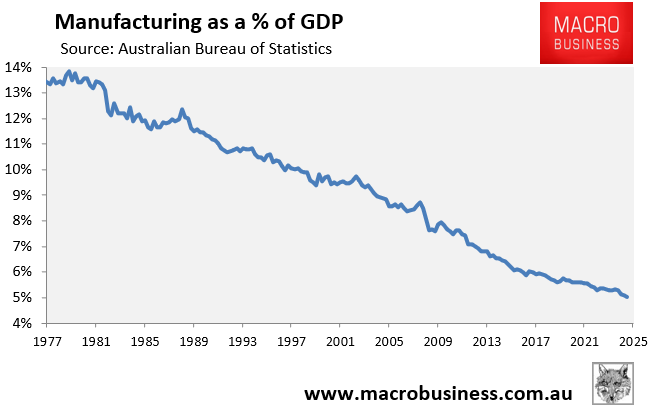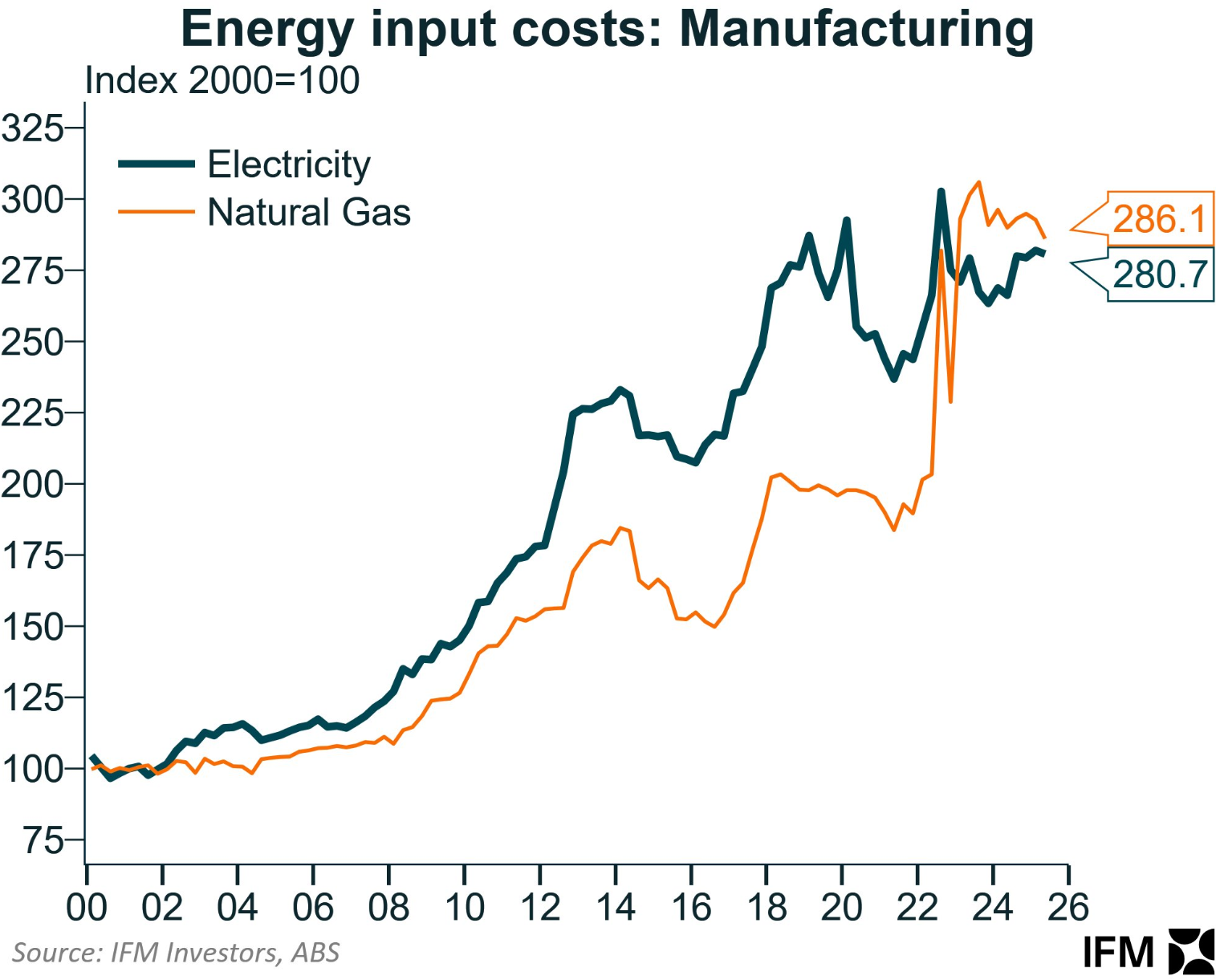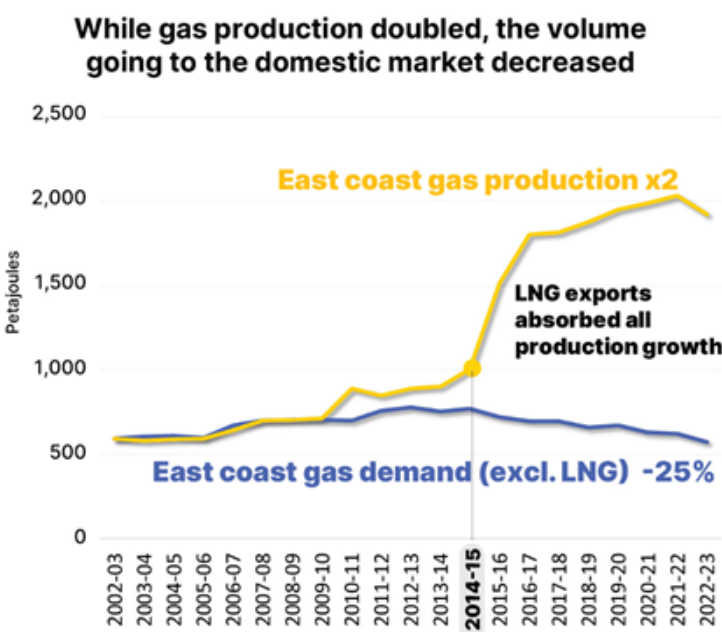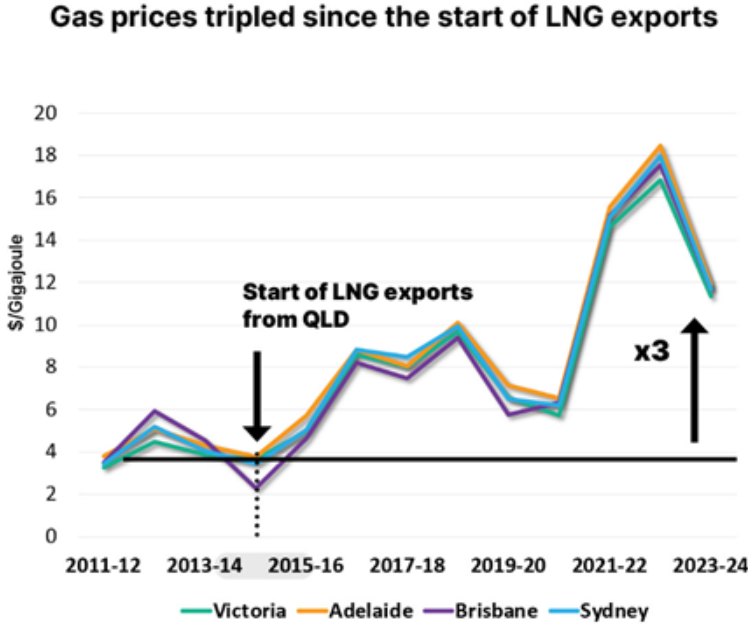In an address to the National Press Club, BlueScope CEO Mark Vassella warned that Australia risks following the United Kingdom’s industrial decline if the federal government fails to fix the gas market.
Vassella and other industry leaders say that without cheaper gas, the federal government’s Future Made in Australia policy is doomed, and Australia will become an industrial wasteland.
Vasella’s comments came as Australia’s manufacturing share of the economy, which is already the smallest in the OECD, fell to a record low of 5.0% of GDP in the June quarter.

Vasella said that the UK should serve as a “cautionary tale” for Australia, whereby high energy costs and poor policies have destroyed the nation’s manufacturing base.
He said that “Australian manufacturing is at a dangerous crossroad”, and that “Major change is required to fix our broken gas market and reinstate a fair domestic price”.

Vasella also debunked the argument that gas reservation would raise so-called “soverign risks”.
“Manufacturing Australia and thousands of their downstream customer businesses are calling for reservation for a proportion of newly contracted and recontracted gas, and immediate reservation for all uncontracted gas. The energy companies should desist from that deliberate line of obfuscation about sovereign risk”, Vassella said in his National Press Club address on Wednesday.
“I think we need to be really careful with the term sovereign risk. There’s enough uncontracted gas to be redirected … to make a change for the Australian economy and not create sovereign risk. Our analysis, confirmed by external experts, indicates that it should be possible to deliver gas to East Coast customers at well below $10 per gigajoule and still achieve reasonable returns on investment for gas companies based on their production costs”.
Vassella also hinted at the need for nuclear energy for the production of clean steel.
“Our steel mill in North America is producing three million tonnes of steel. It’s an electric arc furnace that’s powered by a grid that’s supplied by nuclear energy”, he said.
“So we’re as close to green steel at North Star BlueScope in North America as any steel company in the world. [Nuclear] certainly lowers the emissions. There’s no question”.
As noted previously, East Coast Australia, which exports nearly three-quarters of its gas to Asia, pays the highest gas prices of any gas-exporting jurisdiction in the world.
Since LNG exports commenced out of Gladstone a decade ago, the volume of gas produced on the East Coast has doubled, yet 25% less gas has been supplied to the domestic market.

As a result, the East Coast domestic gas price has tripled over the past decade, which has driven up gas and electricity prices, added to inflation and cost-of-living pressures, and crippled the manufacturing sector, which relies on affordable gas and electricity to survive.

ASIC insolvency statistics revealed that over 1400 manufacturers nationally have collapsed since 2022-23.
Among these, Incitec Pivot, a major fertiliser producer, closed its Australian facilities due to increased energy expenses.
Qenos, Australia’s last major plastics producer, closed in 2024 due to excessive energy costs, leaving the country completely reliant on polymers imported from China.
Oceania Glass, Australia’s sole architectural glass maker, closed in February 2025 after 169 years of operations due to rising energy prices and Chinese dumping.
Orica, the world’s largest manufacturer of mining explosives, chemicals, and agricultural fertilisers, and BlueScope Steel have threatened to downsize their Australian facilities and relocate to the United States in response to rising energy prices.
Manufacturing Australia has urged the federal government to implement an East Coast gas reservation policy and a price cap of $10 per gigajoule to ensure affordable supplies for domestic manufacturers.
Manufacturing Australia believes that retaining just one-third of East Coast output would be sufficient to meet domestic manufacturing and residential needs while still allowing the majority of gas to be exported.
It claims that promptly reserving uncontracted gas would provide immediate help for East Coast manufacturers dealing with rising energy expenses.
You will notice that Manufacturing Australia’s reservation demand is effectively Peter Dutton’s policy launched in the lead-up to the federal election.
Dutton promised to force the gas export cartel to divert between 50-100 petajoules of spot cargo exports to the domestic market via export levies.
Dutton’s policy aimed to secure an additional 10% to 20% of the East Coast’s demand, which otherwise would be exported, in turn lowering domestic gas prices below $10 a gigagoule.
The Coalition also promised to invest $1 billion into a Critical Gas Infrastructure Fund to increase gas pipeline and storage capacity.
The Coalition’s policy would prevent LNG from needing to be imported to the East Coast, thereby stopping prices from soaring further.
Sadly, the Coalition under Susan Ley has ditched Dutton’s excellent gas policy, replacing it with a requirement to have reservation on new or expanded gas projects only, not spot gas supplies.
Resources Minister Madeline King backs foreign gas interests over Australian interests:
While manufacturers are screaming for gas reservation, resources minister Madeline King was busy promoting energy security to Asia amid energy insecurity at home.
Speaking in Western Australia last week, King assured anxious Japanese buyers that any future East Coast gas reserve will not jeopardise Asia’s energy security, claiming that Australia’s massive gas exports are critical to maintaining peace in the Indo-Pacific.
“What is really hard for many Australians to grasp, myself included, is what it feels like to be entirely dependent on other countries for your energy”, King said. “We want them to have energy security, and we want the region to have it”.
King also declared that the Australian government would not do “anything that harms investment or alters existing contracts, or which jeopardises Japan’s energy security” as part of an ongoing review of the gas market.
What about Australian energy security, Madeline? Why do Australian energy users always take a back seat to Asian consumers?
King’s assurances come as Japan imports around twice the Australian gas that it needs and re-exports around half of it for huge profits.
While most of this gas comes from Western Australia and the Northern Territory, around 7% comes from the East Coast. Japan has also lobbied vigorously against an East Coast reservation policy.
Labor MP Ed Husic breaks ranks and demands a gas reservation:
While Resources Minister Madeline King was busy reassuring the Japanese, Labor backbencher Ed Husic called for drastic intervention to combat Asian gas companies reselling Australian exports to other markets and to secure supplies for the East Coast.
Husic said that Asian gas buyers are “playing us off as mugs” profiting off the resale of Aussie gas while East Coast households and industry face high prices and potential supply shortages.
Husic said Australians would be “stunned” at the volume of LNG that was exported and then sold to other countries.
“I don’t know why we don’t have the guts to withstand the brow-beating from foreign multinationals and from foreign buyers when it comes to our own resource”.
“Japan has done this four consecutive years in a row where they have on-sold Australian gas while telling us we should not have a right to intervene. Australia needs to assert itself and we should have mechanisms like ‘use it or lose it’. They are not using it for themselves and just profiting”.
“Enough is enough. Fours years of this is long enough. Our Resources Minister should be asserting or national interest”, he said.
However, Madeline King fired back at Husic, claiming it was reasonable for Asian companies to order a surplus of gas as a backstop given how reliant the country was on imports for its energy needs.
“The gas has to go somewhere if it is going to be produced, the buyers take it [and] they use what they can”, she said.
Clearly, Madeline King is more concerned about Asian buyers profiting from the resale of Australian gas than the energy security of Australians.
The reality is that if East Coast Australia begins importing LNG, the gas price will soar from around $12 a gigajoule currently to import parity prices of around $20 a gigajoule.
As a result, electricity prices will also soar given gas’s vital role in firming and as a marginal price setter in the wholesale electricity market.
If LNG imports commence, only Australian manufacturers that rely on government subsidies will survive.
Energy is the bedrock of a modern economy. Without affordable and reliable energy, an economy will experience cost inflation across the supply chain. The energy-intensive manufacturing sector will also shrink as it can no longer break a profit and compete against cheaper imports.
I discussed these issues in my weekend interview with Luke Grant at Radio 2GB/4BC.

